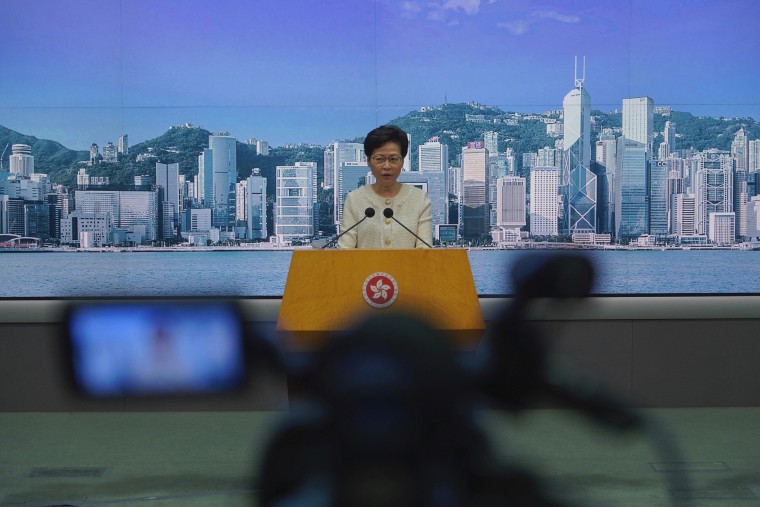It used to be relatively easy for U.S. tech companies to do business in Hong Kong: Its government was largely autonomous from mainland China, and its citizens were guaranteed certain freedoms.
But after China passed a national security law last week that restricts free speech in Hong Kong, tech companies are having to rethink how they can continue to operate in the region, if at all, without becoming complicit in the repression of dissidents.
The fear among app developers and human rights advocates is that the Chinese government could begin demanding account information or other online data about Hong Kong's pro-democracy protesters in ways they haven't before.
Analysts said it would not only be a drastic change for the former British colony but also raise the specter that China’s so-called Great Firewall of strict internet controls is poised to expand.
"Now companies have a question they’re facing, which is, are they going to have to comply with a Chinese-style regime in Hong Kong?" said Matt Perault, director of Duke University’s Center on Science & Technology Policy and a former Facebook public policy director.
Facebook, Google and Twitter all said Monday that they had pressed pause on the information they share with Hong Kong authorities in response to warrants or their equivalent — a position that, over the long term, may threaten their legal status there.
And hours later, TikTok, which has struggled with its own ties to mainland China, went further and said it would leave Hong Kong altogether in light of the perceived threat from China’s national security law. That raised the question of whether the law would chase even more tech companies out of the region.
"The national security law is going to lead to a complete overhaul of how tech companies approach Hong Kong," said Samm Sacks, a cybersecurity policy fellow at New America, a think tank in Washington.
Tensions between the U.S. and China are well known and long-running, covering issues like human rights, cybersecurity, trade and influence in Asia. But China’s leadership is facing rising questions about what critics see as expanding authoritarianism.
The country runs detention camps that, according to leaked records, resemble prisons designed to indoctrinate Muslims. Last month, The Associated Press reported that the Chinese government was forcibly sterilizing minority Muslim Uighurs.
In Hong Kong, police made more than 300 arrests in the first day after the new law took effect last week, and protests have continued. Social media and messaging apps have been crucial to the street demonstrations.
Though some U.S. tech firms such as Apple have deep ties with China for customers or supply chains, they may soon be forced to confront whether they have a future there — with the treatment of Hong Kong the latest factor weighing against their presence.
"What’s going on in Hong Kong lays bare what the Chinese system really is all about. They are repressing the most open corner of China," said Paul Barrett, deputy director of New York University’s Center for Business and Human Rights.
"In the end, some of these decisions are going to be gut-check-style decisions where the question is: 'Do we cooperate with authoritarian governments or not? Do we help the police state keep the citizenry in check?'" Barrett said.
Other nations are asking similar questions about China’s tech influence. India last month banned dozens of Chinese apps, including TikTok, after a border clash between the two countries.
Experts in tech policy and U.S.-China relations said they expected the biggest tech corporations to proceed carefully, watching for how the new law in Hong Kong is enforced and whether the Chinese government puts new demands on their services.
There’s a divide among U.S. tech companies, though, between those that have a limited presence in mainland China such as Google or Facebook — which, consequently, don’t have as much to lose from pushing human rights in Hong Kong — and those with more extensive or complicated business there such as Apple.
Apple in 2018 began to store some of its encryption keys in China, a decision that it said was legally required if it were to go on doing business there but that gave Chinese authorities easier access to text messages and other information stored in the cloud. (Apple users in Hong Kong were not affected, the company said at the time.)
Apple said Monday that it does not receive any requests for user data directly from Hong Kong authorities, instead requiring that they go through a mutual legal assistance treaty in which the U.S. Justice Department reviews such requests.
"We’re assessing the new law, which went into effect less than a week ago, and we have not received any content requests since the law went into effect," Apple said in a statement. (The company also said that encryption keys for Hong Kong users are still kept in U.S. data centers, not in China.)
Apple began taking steps last year to diversify its supply chain and move some work out of China in response to trade tensions. But in other ways the company is expanding cooperation with the government, such as an announcement last month about removing thousands of mobile games that lack government approval.
U.S. tech companies were increasingly on guard against China even before the national security law, with concerns rising about whether they were enabling Chinese military abilities or domestic spying. The U.S. government has been trying to persuade allies to drop purchases from Huawei, a China-based telecommunications equipment maker.
Experts said, though, that they expect the companies to be deliberate before potentially hardening their stance further, especially if they see some benefit to Hong Kong residents to continue to offer encrypted messaging platforms, for example.
"Sometimes withdrawing can have human rights consequences, too," said Duke University’s Perault.
